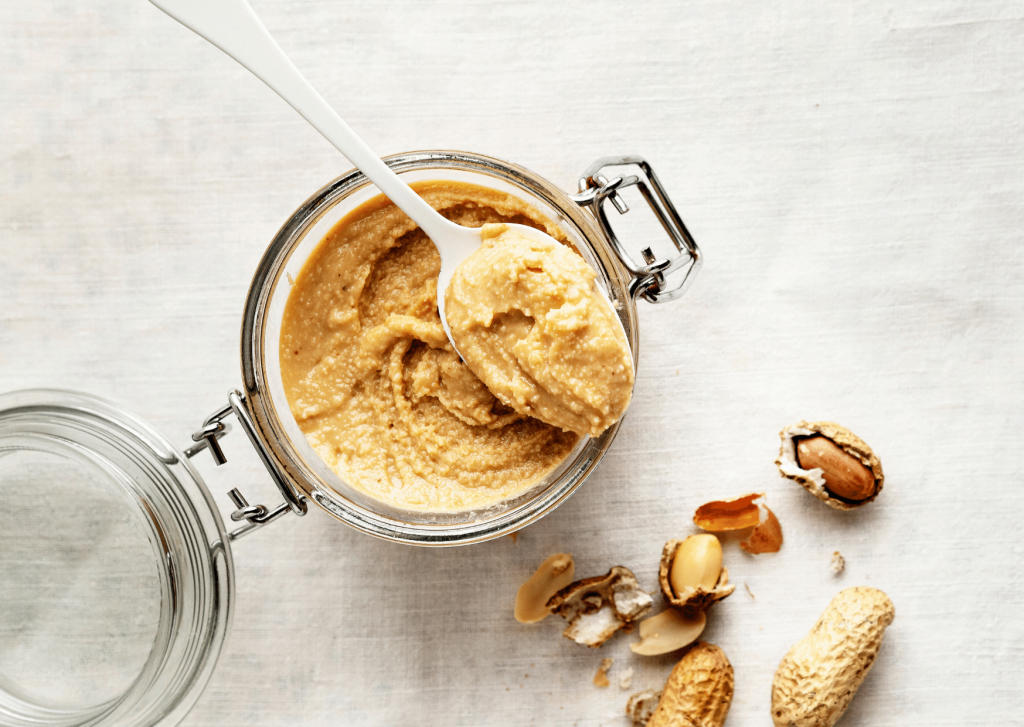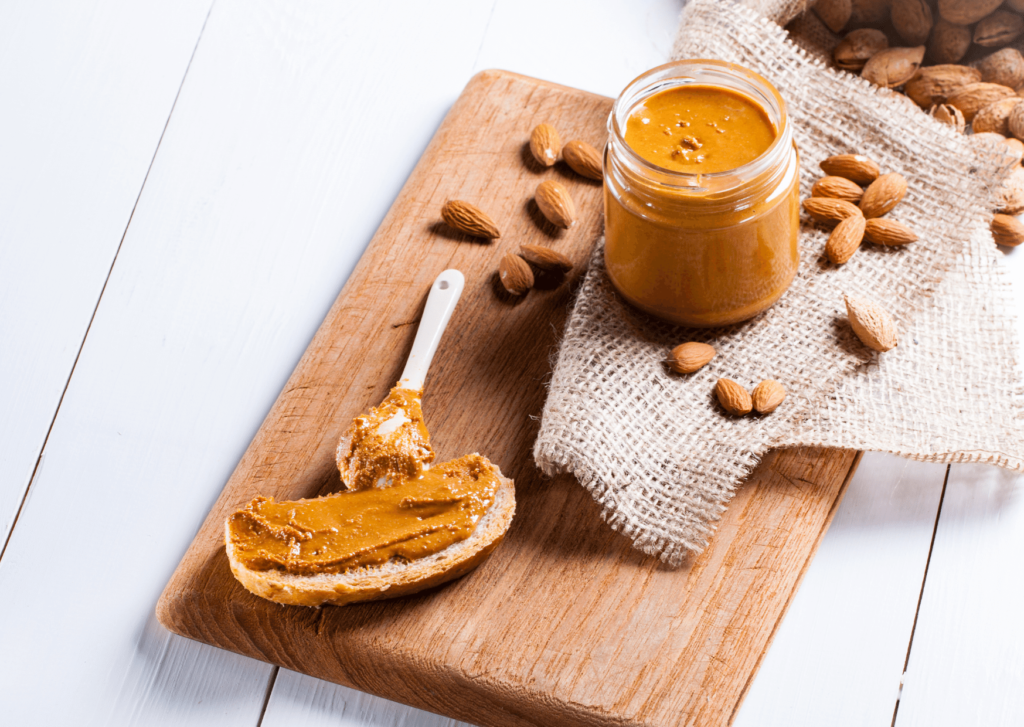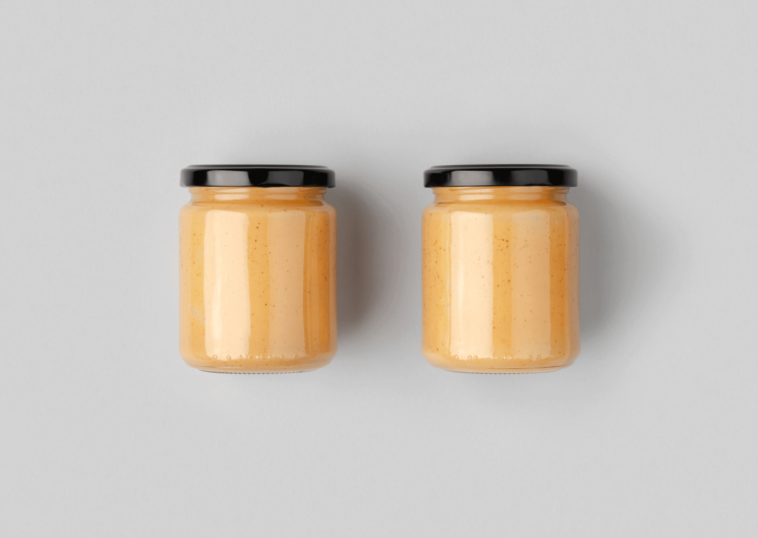Almond butter and peanut butter have a lot in common: For example, they both contain plenty of protein and healthy fats. Even so, almond butter has a better reputation than peanut butter. Grapefruit Dieter explains why this is the case and examines whether almond butter is really healthier than peanut butter.
Almond butter and peanut butter: what’s the difference?
Stone fruit vs. legume
Both almond butter and peanut butter consist of just one ingredient – almonds and peanuts, respectively. However, not both belong to the nut family. Although peanuts have “nut” in their name, according to the botanical definition, peanuts are legumes. Almonds are actually not nuts, but stone fruits, since they are the core of a fruit.
Peanuts require tropical or subtropical climates to grow. That is why their main growing areas are in South America and Africa in Senegal and Nigeria. But peanuts are also grown in Asia, Spain and the south of the USA.
Almonds grow on trees and are closely related to cashews and walnuts. Almost 80 percent of all almonds in the US are harvested in California. In addition to California, for example, almonds also grow in Spain and Middle Eastern countries.
In contrast to the peanut plant, almond trees need a lot of water to grow. In addition, their flowers must be pollinated by bees. The peanut plant is not dependent on bees as it is self-fertilizing.
The water-intensive almond production has a significant impact on water availability in the growing areas. For this reason, the cultivation of almonds is viewed critically with regard to the sustainable use of resources.

Taste and use
Peanut butter and almond butter each taste intensely like the nut or legume used. Peanut butter has a distinctive smell and a thicker and tougher consistency than almond butter. Almond butter tastes a little sweeter than peanut butter.
Almond butter can be made from both raw and roasted almonds. The peanuts for peanut butter are basically roasted.
Almond butter and peanut butter can be used in many ways in the kitchen. They taste great as a spread on bread, a creamy extra in a smoothie, or eaten with fruits.
Nutrients comparison
As already mentioned, almond butter and peanut butter are made from just one ingredient, almonds and peanuts. The following table shows the ingredients of two tablespoons (32 grams) of almond butter and peanut butter in comparison.
The abbreviation RDI is English and stands for “recommended daily intake”.
| Peanut buttter | Almond butter | |
|---|---|---|
| Kilo calories | 188 | 202 |
| protein | 8 grams | 5 grams |
| Total fat | 16 grams | 19 grams |
| monounsaturated fatty acids | 8 grams | 12 grams |
| Hereof: saturated fatty acids | 3 grams | 2 grams |
| carbohydrates | 6 grams | 7 grams |
| Fiber | 2 grams | 1 gram |
| magnesium | 12 percent / RDI | 24 percent / RDI |
| Calcium | 1 percent / RDI | 9 percent / RDI |
| iron | 3 percent / RDI | 6 percent / RDI |
| phosphorus | 11 percent / RDi | 16 percent / RDI |
| manganese | 23 percent / RDI | 38 percent / RDI |
| niacin | 21 percent / RDI | 4 percent / RDI |
| copper | 8 percent / RDI | 14 percent / RDI |
| Vitamin E. | 14 percent / RDI | 42 percent / RDI |
| Folate / vitamin B9 | 6 percent / RDI | 6 percent / RDI |
| Riboflavin / vitamin B2 | 2 percent / RDI | 12 percent / RDI |
| Vitamin B6 | 9 percent / RDI | 6 percent / RDI |
Almond butter and peanut butter do not differ much in their ingredients. Peanut butter contains slightly fewer calories and more protein than almond butter.
Both are high in fat. Most of the fat in almond butter and peanut butter also consists of valuable monounsaturated and polyunsaturated fatty acids.
Peanut butter contains slightly fewer calories and more protein than almond butter. In return, almond butter scores with a significantly higher proportion of magnesium, calcium, manganese and vitamin E.

Health benefits
The table above shows that peanuts have a similar nutritional composition to almonds or other nuts. That is why they are often counted among the nuts in health assessments.
Regular consumption of almond butter and peanut butter, has the following health benefits:
- Protection against heart disease: Numerous studies confirm that eating nuts, including almonds and peanuts, helps prevent heart disease. One review study found that eating four or more servings of nuts a week can lower the risk of heart disease by up to 37 percent (1).
- Lowering Blood Pressure: Nuts contain various ingredients, such as copper and magnesium, which help lower blood pressure. As the table above shows, almonds are particular rich in both minerals (2) .
- Lower cholesterol: Nuts have an optimal ratio of polyunsaturated to monounsaturated fatty acids. This has a positive effect on the total cholesterol level. Regular consumption of nuts also helps raise health – promoting HDL cholesterol and lowering health-damaging LDL cholesterol (3).
- Protection against obesity: nuts are high in calories due to their high fat content. 100 grams of peanut butter contains around 590 kilocalories, 100 grams of almond butter even around 630 kilocalories. Even so, studies show that consuming them helps maintain a healthy weight. Scientific studies have also found that calorie burning is increased after eating nuts.
- Blood sugar regulation: The regular consumption of nuts like almonds and peanuts also help control blood sugar levels to regulate and prevent blood sugar spikes. This is mainly due to the fact that nuts are low in carbohydrates, but at the same time rich in protein and fat (4).
- Cell protection: Nuts, like almonds and peanuts, are rich in vitamin E, an antioxidant that protects cells from free radicals. Almond butter contains more vitamin E than peanut butter. Nevertheless, both are considered valuable suppliers of this cell-protecting vitamin (5) .
- Protection against gallstones: Various studies show that regular consumption of nuts reduces the risk of gallstones forming. This is mainly due to the unsaturated fatty acids and dietary fiber contained in nuts (6) .
Both almond butter and peanut butter have some health benefits. For example, they lower cholesterol and blood pressure and protect against coronary heart disease.
Peanut butter VS almond butter: which is healthier?
So peanut butter and almond butter are both healthy – but which of the two is healthier? Some people believe that almond butter is a healthier alternative, as it is up to three times more expensive than peanut butter in the supermarket. This is nonsense.
The price of almond butter does not represent a higher health value. Almonds are simply more expensive to produce because they consume a lot of water.
The detailed comparison of almond butter and peanut butter shows that neither of the two can be rated as healthier. Peanut butter contains more protein and slightly fewer calories than almond butter, but almond butter scores with a higher proportion of minerals and vitamins.
So there is no winner in this duel. Both almond butter and peanut butter are recommended from a health perspective.
However, when buying the products, you should make sure that they really only consist of one ingredient, namely almonds or peanuts, and that they have not been fortified with sweeteners, fats or other additives.
Summary
Almonds grow on trees and belong to the stone fruit family. Peanuts grow in pods under the ground and are therefore considered to be legumes.
Almond butter and peanut butter consist of just one ingredient, almonds and peanuts, respectively. The consistency of peanut butter is tough, almond butter is more liquid and tastes a little sweeter. Both can be used equally in the kitchen.
Almond butter and peanut butter do not differ much in their ingredients. Peanut butter contains slightly fewer calories and more protein than almond butter. In return, almond butter scores with a higher proportion of some minerals and vitamins.
Both have health benefits: for example, they lower cholesterol and blood pressure and protect against coronary heart disease.
Almond butter and peanut butter are equally healthy. When purchasing the products, however, you should ensure that they only consist of one ingredient, namely almonds or peanuts, and that they do not contain sweeteners, fats or other additives.
- Eating a daily serving of nuts linked with lower risk of heart disease
- Zinc, copper, and blood pressure: Human population studies
- Nuts, blood lipids and cardiovascular disease
- Effect of Tree Nuts on Glycemic Control in Diabetes: A Systematic Review and Meta-Analysis of Randomized Controlled Dietary Trials
- Vitamine E health benefits
- A prospective cohort study of nut consumption and the risk of gallstone disease in men



